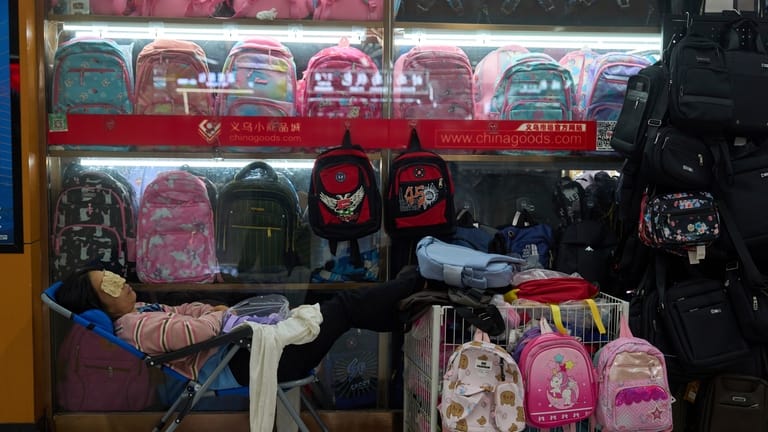Here’s what some exporters in China say about Trump’s trade war

YIWU, China — The trade war between the world’s two largest economies is escalating as China on Friday slapped a 125% tariff on U.S. goods in response to President Donald Trump’s 145% tariff on Chinese products.
Caught in the crosshairs are businesses that are part of the more than $582.4 billion trade between the countries, with Chinese exporters making up the bulk of that exchange.
Here’s what some of them had to say. Most of them spoke in the eastern city of Yiwu, known as home to the world’s largest wholesale market:
JIANG JIAYU, owner of Yiwu Jiayu Festive Supplies Co.
American customers would normally be placing their Christmas orders at this time of year, she said, but right now, there is no sign of them. U.S. customers make up about 10% of Jiang’s business. She said she didn’t understand the purpose of Trump’s tariffs.
“Can the U.S. produce what China, or Yiwu is producing now? Ordinary people are the ones who will get hurt the most by the tariffs,” she said. “I don’t think he can continue his behavior for long.”
But she said she would rather pull out of the market completely than pay the hefty U.S. tariffs.
“At worst, we just quit,” she said. “We will not lose money just to keep this market.”
A vendor naps near bags for sale at the Yiwu International Trade Market in Yiwu, eastern China’s Zhejiang province on Thursday, April 10, 2025. Credit: AP/Ng Han Guan
WU LIYING, owner of Xinyue Socks Co.
Wu runs a shop selling socks of all hues, printed with cartoon characters, stripes or Christmas-themed ornaments. She said she is yet to feel the impact from the new levies, but knows it is only a matter of time before overseas trade becomes more complicated.
“Our clients will have no profit to make, and neither will we,” she said. “We are all in the business to make money, but if nobody makes money, the purpose of win-win cooperation will no longer exist.”
MARGARET ZHUANG, an employee in a kitchen supplies factory
“The tariffs are so high that it is the same if adding another 200%,” said Margaret Zhuang, an employee who handles foreign sales at a factory for wooden kitchen supplies in Dongyang in southern Guangzhou province.
Zhuang said her American client asked the company to stop manufacturing on Monday, when Trump raised the tariffs to 125%, even after paying a 30% deposit for the order.

A vendor naps at the Yiwu International Trade Market in Yiwu, eastern China’s Zhejiang province on Thursday, April 10, 2025. Credit: AP/Ng Han Guan
Comparing the trade war to Trump’s first presidency in 2018, Zhuang said things are much worse this time around, because China’s economy is in a slump. She’s worried that she and her 40 colleagues will have no income when work stops, and that she could lose her job.
Zhuang used to hope the U.S. and China would negotiate to “give each other a lifeline.”
“But now we all know, the U.S. just want to break it off,” she said.
DING DANDAN, Christmas decorations seller
An exporter of Christmas decorations, Ding Dandan believes U.S. customers will still buy from Yiwu, at least in the short term, because they have nowhere else to go.
“Do you know 90% of Christmas-related goods in the U.S. are from China?” said Ding, who often sells to the U.S. market via intermediaries in third countries such as Mexico.
“If China does not export them, the U.S. will not be able to import such large amount of goods from elsewhere, right?”
Source link



